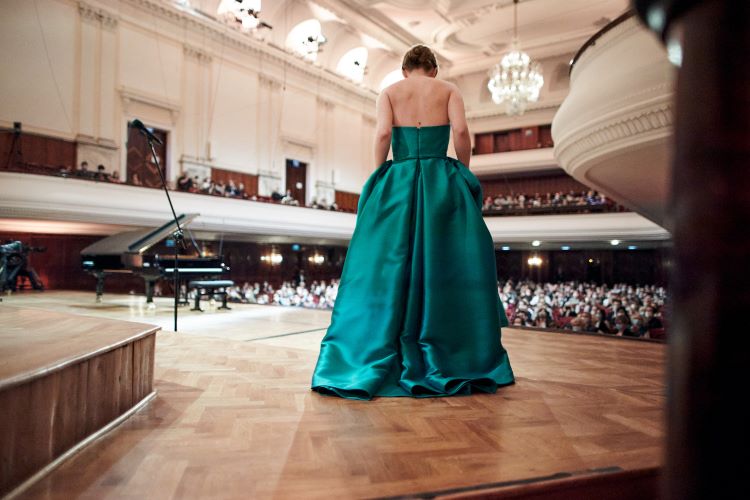
In Pianoforte, director Jakub Piątek looks at the International Chopin Piano Competition – known to insiders as the “piano Olympics”; it’s the kind of competition that can launch a career. Competitions are almost always compelling to view, with a suspenseful narrative trajectory. Yet Piątek’s emphasis is more on character than outcome, the identity of the ultimate winner is less important than the different individuals under the camera’s gaze and their experiences. I imagine it must have been somewhat suspenseful for the director as well, since having decided to follow 6 of the 87 competitors, at each stage of the competition there was a chance that one or more of his protagonists would not make it to the next stage.
Pianoforte is a fascinating look behind the scenes of the competition, as seen primarily through the experiences of 6 competitors: Leonora Armellini, Michelle Candotti, Alexander Gadjiev, Eva Gevorgyan, Hao Rao, and Marcin Wieczorek. Moving deftly from one individual to another along the competition timeline, crisp editing creates a lively tempo for this documentary and the soundtrack is suffused with the beauty of Chopin’s music. Observing the competition fly-on-the-wall style, the film takes the viewer into the intensity of the young pianists and their world.
Held every five years in Warsaw, Poland, the International Chopin Piano Competition is organized by the Fryderyk Chopin Institute. It’s a grueling process that lasts 21 days. Like any other athlete, the pianists are constantly training, and scenes of Alexander’s teacher giving him encouraging affirmations “creative energy is coming to you” or Eva working out in the gym, reinforce this comparison. All but two of the pianists followed in the film were in their mid-to-late twenties at the time of the competition, Eva and Hao were both just 17 at the time of the competition. Watching the pianists as they wait their turn to perform, or after they finish playing, their tension and exhaustion are apparent. Becoming a concert pianist is not for the faint of heart.
Coming from different backgrounds, although they all practice the same art, it soon becomes apparent that their teachers have different approaches. It is also interesting to see the different relationships between student and teacher. Vivian Li, Hao’s teacher, has been working with him since he was very young. She is very nurturing and caring towards Hao, and even says that she is like a mother to him. Eva’s teacher appears to take a different, more strict approach, with meticulous, almost relentless critique, admonishing her at one point to “keep working, keep working.” And work they all do, even when they don’t feel like it. Marcin wistfully talks about wanting to have an Xbox, but immediately qualifies that wish by saying “just for a few days, then I’d work hard again.”
Some of the pianists socialize together, like Leonora and Alexander, sharing their worries and fears, or celebrating when they advance to the next stage. Others are more solitary. Michelle’s vivacious descriptions of her feelings, dreams – both literal and figurative, and frustrations were one of the great pleasures of this film. Yet although some of the pianists revealed less of their inner world, they too engage the viewer’s empathy.
Pianoforte will be screened at the 2023 Docaviv film festival which will take place from May 11 – 20, 2023. The full program and schedule are available on the Docaviv website.
Pianoforte
Poland/2023/89 min/English, Russian, Chinese, Italian, Polish and Slovene with English and Hebrew subtitles
Director: Jakub Piątek; Editing: Ula Klimek-Piątek; Cinematography: Filip Drożdż; Sound Design: Anna Rok, Michał Fojcik, Joanna Popwiczk





